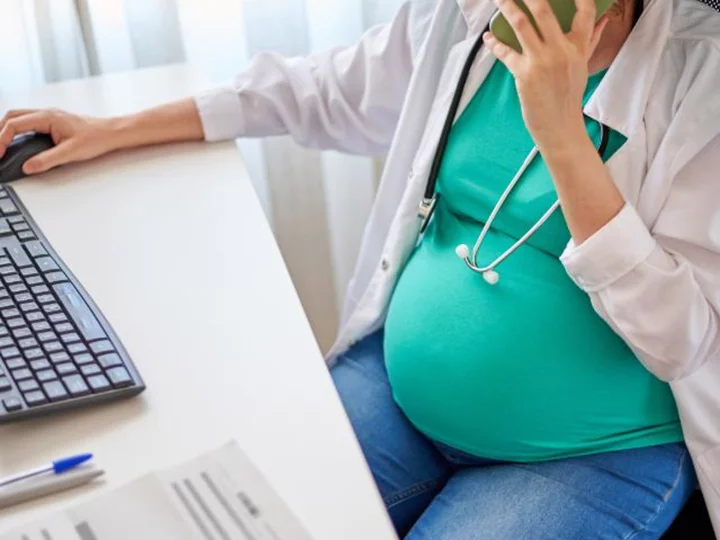Pregnant workers should have an easier time getting a stool, extra bathroom breaks or a bottle of water without fear of getting fired, thanks to a new law that takes effect on Tuesday.
The Pregnant Workers Fairness Act, which Congress passed as part of a federal government spending package in December, requires employers to provide "reasonable accommodations" related to pregnancy or childbirth unless they would cause an "undue hardship." It applies to businesses with at least 15 employees.
The law is one of two enhanced job-based protections for expectant and new mothers contained in the spending package. The other, the PUMP for Nursing Mothers Act, expands the right to have break time and a private place outside of a bathroom to pump to nearly 9 million more breastfeeding workers who were not covered under a previous Affordable Care Act provision. They include teachers, registered nurses, farm workers and others.
Annually, nearly 2.8 million pregnant women -- 70% of all pregnant women -- worked while they were expecting, according to the National Partnership for Women & Families.
Advocates have been fighting to improve federal protections for pregnant workers for more than a decade, saying that the Pregnancy Discrimination Act is inadequate and that most pregnancy-related conditions are not considered disabilities under the Americans with Disabilities Act.
"At long last, pregnant workers can no longer be forced off the job for needing light duty work or a stool to sit on to maintain a healthy pregnancy," said Dina Bakst, co-founder and co-president of A Better Balance, a national legal advocacy organization. "Working moms no longer have to fear job loss for needing time off to safely recover from childbirth. No longer will women nationwide face the impossible choice between maintaining a healthy pregnancy and affording food for their families."
Other accommodations could include flexible scheduling for doctor appointments, additional or longer breaks for eating, drinking and using the bathroom, permission to wear maternity pants, changes to work schedules and time off to recover from childbirth.
More than 30 states and cities have laws providing accommodations for at least some pregnant workers, according to the US Equal Employment Opportunity Commission.
Fighting for accommodations
Armanda Legros is one mom who could have benefited from the law had it been in effect when she was pregnant with her second son in 2012.
Legros was working for an armored truck company on Long Island, New York, lifting bags of money and 40-pound boxes of coins, sometimes two or three at a time. Six months into her pregnancy, she pulled a muscle in her stomach. Her doctor gave her a note saying she should not do heavy lifting.
Instead of allowing Legros to just drive the truck or expand the administrative work she was already doing, the company fired her. It was hard for her to get another job -- because she was visibly pregnant, she believes -- so she had to apply for food stamps and almost lost her apartment.
The experience prompted her to become a community advocate with A Better Balance.
"I didn't want what happened to me to happen to any other mom," said Legros, now a married mother of four living in Rosharon, Texas, and working at a credit union. "If the act was available at the time, this would not have happened to me. I would not have gone through the struggles I did if the protections were there."
Support from businesses
The US Chamber of Commerce was among the supporters of the two provisions.
The Pregnant Workers Fairness Act clears up confusion left in the wake of a 2015 Supreme Court ruling that involved a pregnant worker seeking an accommodation, said Marc Freedman, vice president of workplace policy at the Chamber. It left employers unclear as to what their obligations are and what employees' rights are. And it prompted workers who thought they should get accommodations to take their employers to court.
"We believe it is going to reduce the chances for that type of litigation and provide clarity to employers about what their obligations are," Freedman said, noting that it builds on the ADA's existing process. "Our expectation is that a high majority of these requests for accommodation will lead to employers and employees finding a way to work things out."
Under the act, a pregnant worker asks her employer for an accommodation. They then have a discussion about whether the request can be granted. If it can't, putting the worker on leave is a last-resort option, Freedman said. The worker can also file a challenge with the EEOC if she is not provided an accommodation.
Among employment attorney Roger Feicht's clients, the main request from pregnant workers is scheduling flexibility, such as a change in shift, a few days off or a modified schedule. Feicht, who works for Gunster, a Florida-based law firm, recommends companies update their employee handbooks or other written policies so workers understand their rights and the human resources personnel understand their obligations.
Some of his clients are trying to walk through hypothetical scenarios to explore what are available options and what might create hardships for the employers, he said.
While many employers already provide accommodations, countless workers have called A Better Balance's help line to complain that their requests were turned down, Bakst said. But the law will help more than just the expecting moms.
"Keeping women working is good for women, it's good for businesses, it's good for the economy," she said.









